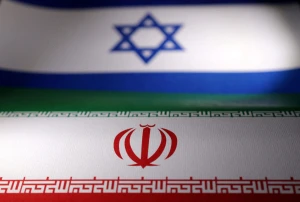‘Easy money, heavy price’ - Israel Police & Shin Bet start awareness campaign to warn against spying for Iran
Campaign seeks to deter Israelis from aiding Iran for money, a phenomenon which increased significantly during the war

Israeli security officials have started a public awareness campaign in order to warn citizens about attempts by Iran to recruit people for intelligence-gathering operations.
The campaign, launched by the National Public Diplomacy Directorate and the Israel Security Agency (Shin Bet), is called “Easy Money, Heavy Price,” and will be placed on newspapers, websites, social media platforms, and even radio, to raise awareness about the Iranian recruitment attempts and the consequences of participation in such actions.
The announcement of the campaign comes as police have been moving forward with several cases against Israelis arrested for carrying out acts of espionage for Iranian agents, who often initiated contact via social media. The Shin Bet reported that over 25 cases of Iranian attempts at recruitment were discovered over the past year, with 25 indictments being filed as a result.
The latest case was revealed on Thursday, as security services announced that a 33-year-old Bedouin school teacher from the Negev was arrested last month on suspicion of committing serious security offenses, maintaining contact with Iranian intelligence elements and carrying out missions directed by them.
Among other offenses, the teacher is suspected of carrying out missions amid the "Rising Lion" war against Iran, including collecting intelligence on the IDF's Nevatim Air Force base by filming the takeoffs of fighter jets.
In addition to cases where contact had been established, Shin Bet also revealed that it had made several warning calls to Israelis who had only been contacted by Iranian agents, but had not yet engaged in any activities.
Israeli Police have brought the cases to prosecution, with 17 being handled by the National Unit for Serious and International Crime Investigations, a unit within the Lahav 433 organization, which roughly corresponds to the U.S. FBI. The other eight cases are being handled by local police districts.
Lt. Col. Sarit Peretz, head of the security division at Lahav 433, told Maariv that investigators first noticed the phenomenon following the start of the Oct. 7, 2023, Gaza War.
"Our unit has so far dealt with 17 espionage cases. We're talking about the whole phenomenon of espionage affairs that began with the outbreak of the war, and the Iranians were very motivated to find cooperation from inside Israel,” she explained.
The first case Lahav 433 discovered involved an ultra-Orthodox man from Bet Shemesh.
“It was in July 2024, an affair that didn't really get exposure. In those days, no one knew that this was a phenomenon, it was some unique case,” she recounted. She said that case ended up being the one that “broke the whole phenomenon.”
This soon led to “a series of cases” exposing the broad Iranian attempts to recruit Israelis to carry out harmful espionage activities against their own country.
“From here we begin a series of cases, each involving two or three suspects who had ties to Iran,” Lt. Col. Peretz noted.
She explains that “in most cases, the connection begins on the various social media platforms, and it is a connection that begins in a clear way, that it is clear that it is Iran.”
However, she also noted that “sometimes it [the initial contact] is disguised as a journalist, or a friendly or romantic connection, but very quickly we reach a stage where our Israeli side knows and understands that this is a foreign entity that is an enemy, that has a goal of harming the State of Israel. Very quickly they understand that these are Iranian entities.”
Asked why Israelis persist with contact once they understand that they are dealing with a hostile foreign entity, Lt. Col Peretz responded, “The motive is money and easy money. It comes from a desire to get the money as quickly as possible.”
She also notes that there is a facilitating factor of anonymity, which makes it easier for the citizens to persist.
“There's the issue of anonymity here, without meeting the exact person, it seems that it's more convenient to receive money from ‘I don't know who.'”
Payments are often made through online payment systems or cryptocurrencies, which also facilitate the issue of anonymity and the ease of money transfer.
In a statement released alongside the new campaign, security officials called it a matter of “great national importance.”
“The campaign is of great national importance, especially following Operation Rising Lion, after which the Iranian enemy is expected to intensify its recruitment efforts and carry out missions inside Israel. The public will be exposed to the campaign, which was carried out through the Government Advertising Bureau, on the radio, on the leading websites, and on social networks. As part of the campaign, citizens are asked to report any suspicious inquiries to the police,” the statement said.
The campaign videos also state that the legal consequences for participating in Iranian espionage can include up to 15 years imprisonment for serious security offenses and a life sentence for cases found to be critical.
“Easy money, heavy price!” The video states. “For you, for your family, for your country. Don’t help the Iranian enemy.”

The All Israel News Staff is a team of journalists in Israel.
You might also like to read this:










